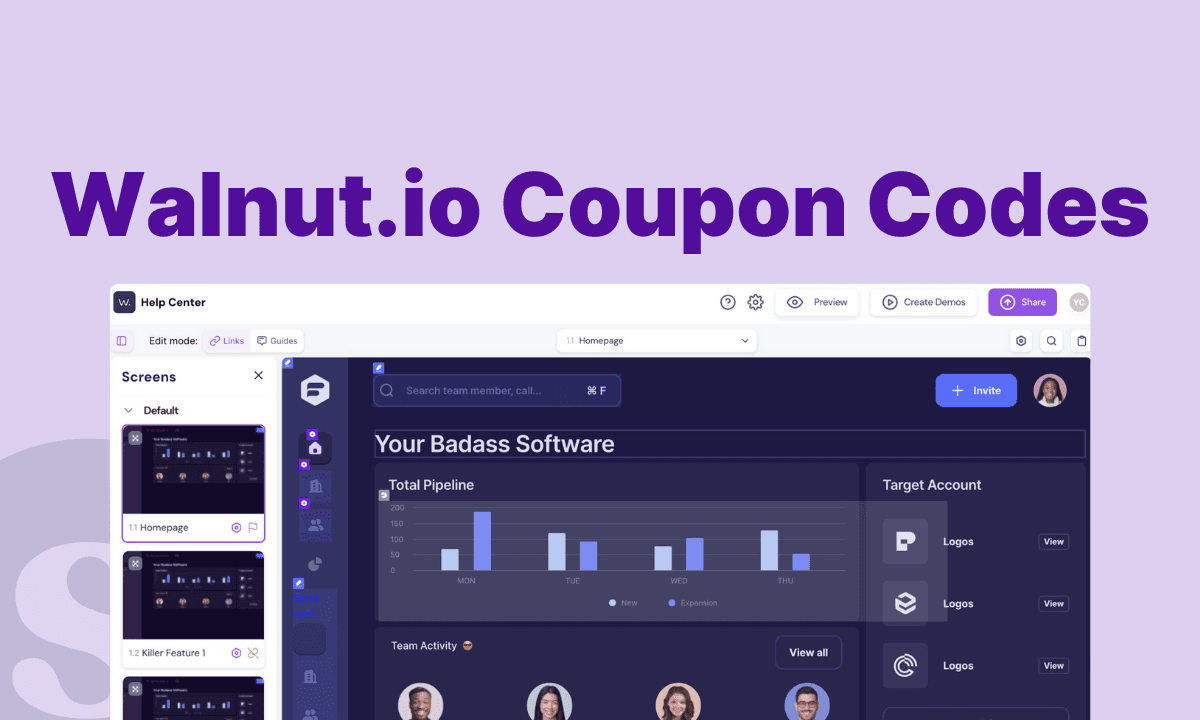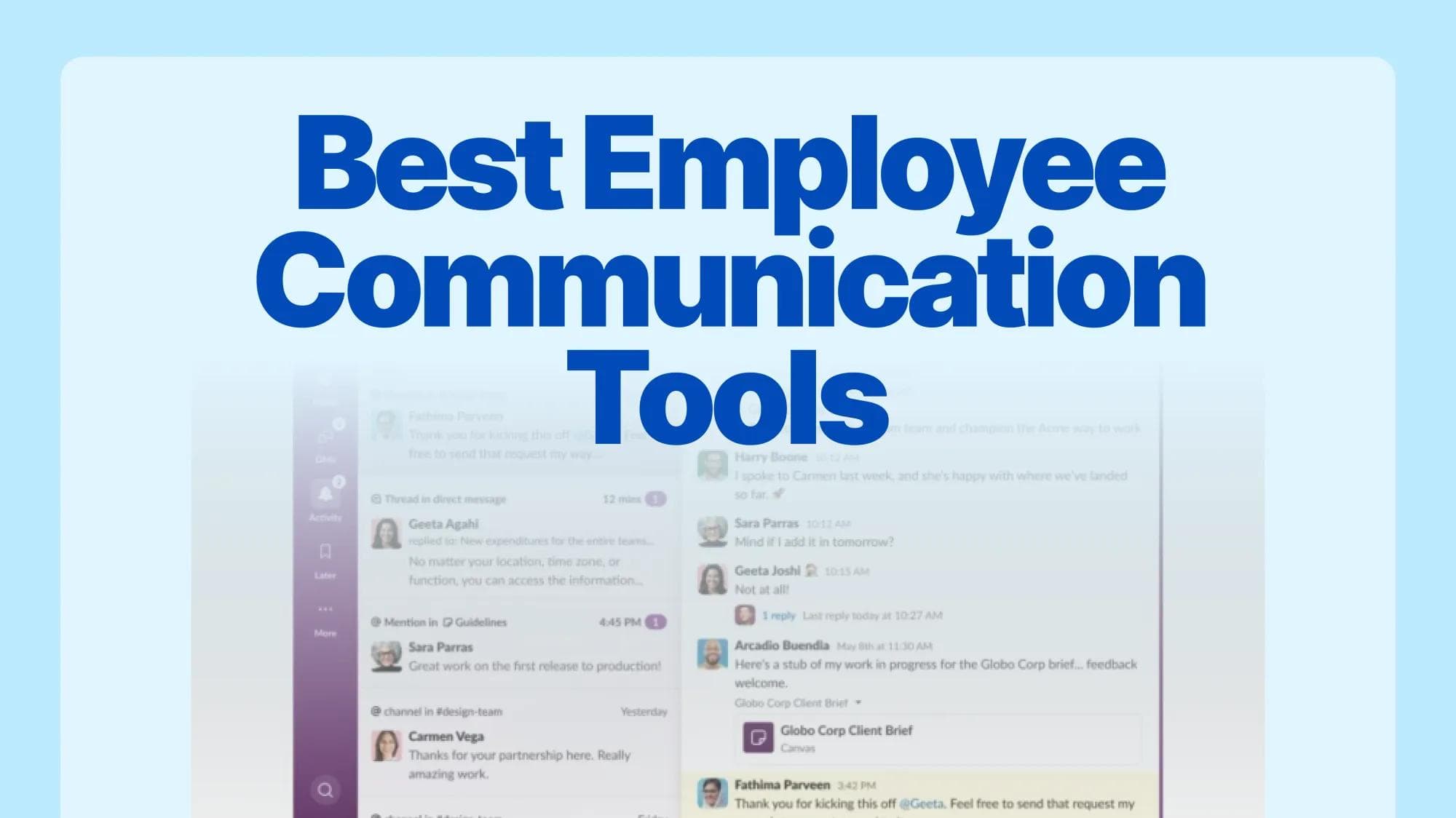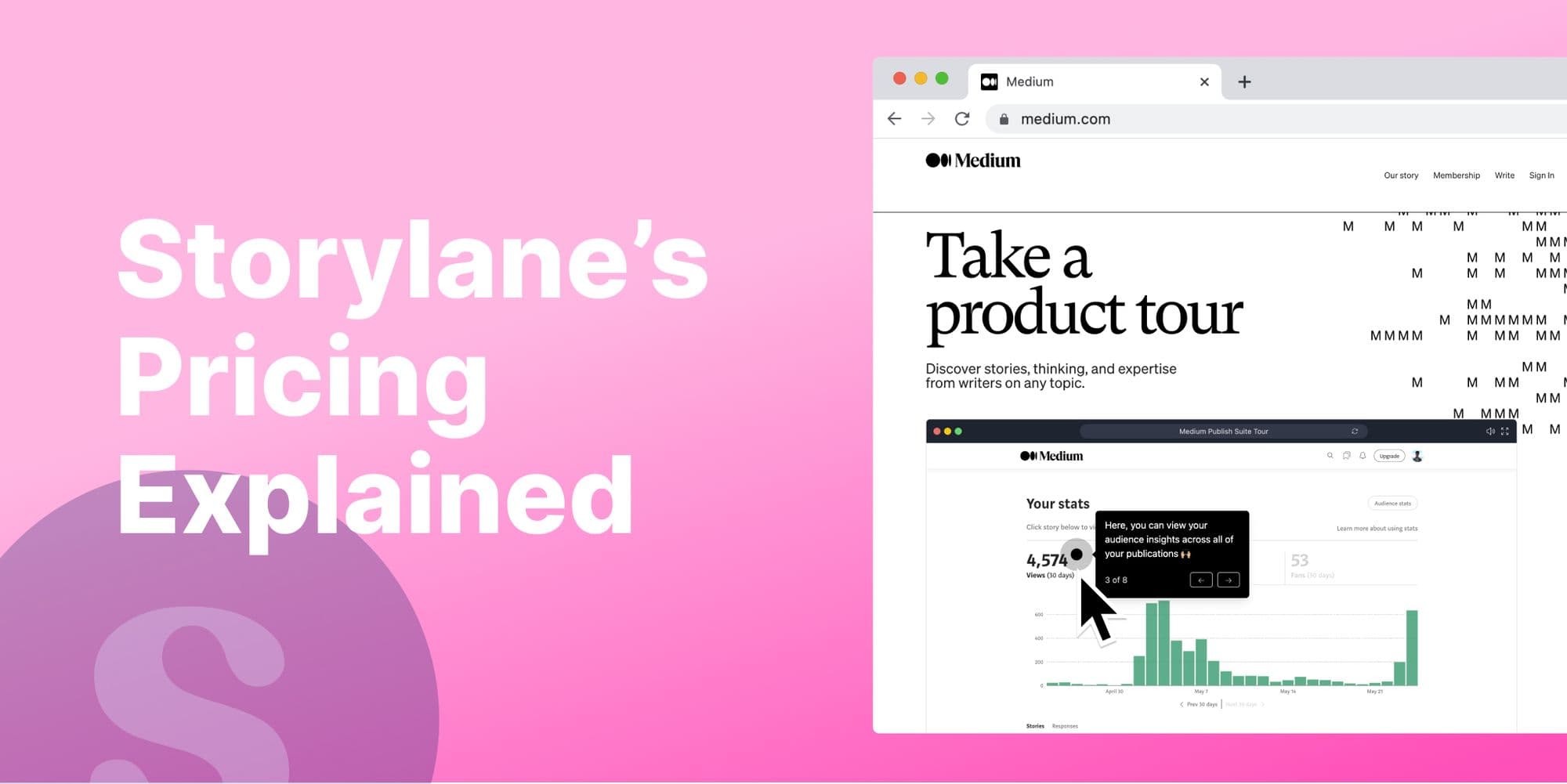
You want interactive demos that wow buyers, not your finance team with a $10k invoice. So you did what any smart founder or marketer would: searched for a Walnut.io coupon code.
Maybe you hoped for a secret discount. Maybe you just wanted to see if the price matches the hype. Either way, you're in the right place.
This guide breaks down what Walnut really costs, whether discounts are on the table, and why teams are switching to Supademo for enterprise-quality demos, without the enterprise price tag.
Let's get into it.
Does Walnut.io offer coupon codes or startup discounts?
While many SaaS tools promote coupon codes or startup-friendly pricing, Walnut.io takes a more traditional enterprise approach. There are no promo codes to apply at checkout, and you won’t find publicized startup discounts on their site.
No free trial or freemium option
There’s currently no free trial or freemium version of Walnut.io. Users can’t explore the product hands-on without going through a demo or setup process first, which may pose a hurdle for smaller teams wanting to test the waters before committing nearly $10K per year.
Startup discounts? Still unclear
As of now, Walnut.io doesn’t advertise any specific startup discounts. There’s no mention of early-stage pricing tiers, accelerator partnerships, or founder-specific offers.
For startups evaluating demo software, this could make lower-cost, more flexible tools like Supademo worth a closer look.
Current Walnut.io pricing overview (2026)
Walnut's pricing includes three primary plans, each structured around annual billing:
- Lite Plan – $9,200/year: Designed for smaller teams beginning their product-led growth journey, this plan includes unlimited demos, website embeds, integrations, demo analytics, playlists, and HubSpot support via Walnut Uncover. However, it lacks hands-on onboarding or Salesforce integration.
- Pro Plan – $20,000/year: Geared toward scaling teams, the Pro plan adds a dedicated Customer Success Manager, go-live training, and advanced Salesforce integration. It also includes premium add-ons like video overlay, which are optional in the Lite tier.
- Enterprise Plan (Custom pricing): Custom pricing: Built for larger orgs, this tier layers in white-labeling, SSO, on-site support, multi-team enablement, and enterprise-grade security. It’s designed for complex GTM operations and typically involves multiple stakeholders.
In addition to base plans, add-on features such as offline demos, advanced translations, and white label options can push the total cost higher, especially for Pro and Enterprise customers. While pricing transparency has improved, entry remains high, and early-stage startups may still struggle to justify the spend without a trial or founder-specific deal in place.
Finding potential Walnut.io discounts
If you’re searching for a Walnut.io coupon code, you’ll quickly notice: there aren’t any public promo codes.
Like most traditional enterprise sales softwares, Walnut uses a sales-driven pricing model, meaning discounts are hidden behind negotiations and partnerships. But with the right approach, you can still score a better deal. Here’s how:
1. Negotiate longer-term contracts for built-in discounts
One of the most reliable ways to secure a lower price with Walnut.io is by opting for annual or multi-year contracts. Like many B2B SaaS companies, Walnut often rewards long-term commitments with 10%–30% price reductions.
Not only does this lock in predictable revenue for them, but it also gives your finance team a stable annual cost, especially helpful if you’re budgeting for GTM tools across quarters.
Before you sign a deal, ask: “Do you offer better pricing if we commit for 12 months or more?” It's a reasonable question and often leads to a better quote.
2. Time your inquiry near the end of the quarter
Sales timing matters. Reaching out at the end of a sales quarter (March, June, September, or December) increases your odds of getting a discount. Most B2B sales reps are working toward quarterly targets and commission thresholds. If your conversation coincides with quota season, you’ll likely get more flexibility on price, onboarding support, or free add-ons like additional demo seats.
3. Ask for startup or scaleup pricing (even if it’s not listed)
Walnut doesn’t publicly advertise a startup plan, but that doesn’t mean one doesn’t exist. Many B2B tools offer custom startup pricing or pilot packages for early-stage companies, especially those with fewer than 50 employees or minimal funding. If you're a seed-stage or bootstrapped company with growth potential, communicate that clearly.
Frame your ask around long-term value: “We’re just starting to scale our GTM motion — if this goes well, we’ll grow into a bigger plan within the next 6–12 months.” Vendors like Walnut often take that seriously.
4. Explore vertical or partner-based discounts
Industry-specific pricing is another lever. Companies in regulated sectors like healthcare or finance sometimes receive custom offers based on compliance needs or security expectations. If your company operates in a niche vertical, bring that up.
Also, don’t underestimate third-party marketplaces. Walnut is currently listed on NachoNacho, a B2B SaaS marketplace known for exclusive partner deals.

Even if it’s just a few hundred dollars off, that discount adds up, especially if you’re an early-stage team with a lean SaaS stack.
5. Consider pitching a pilot or internal use case
Finally, if you're unsure about a long-term commitment, ask about a pilot license. Companies sometimes offer 30- to 60-day paid pilots or sandbox access in exchange for feedback or internal use validation. If you're testing demos for internal onboarding, customer education, or a product launch, this can be a low-risk way to get started.
And if you're evaluating alternatives like Supademo, mentioning that in a call can also trigger competitive pricing options.
Limitations of Walnut.io (Even with discounts)
Even with a discount, Walnut.io isn’t the right fit for everyone. From pricing to technical limitations, there are trade-offs to consider, especially for lean teams or those prioritizing speed and flexibility:
- High pricing floor: Walnut’s Lite plan starts at $9,200 per year, which is significantly higher than many competitors offering plans below $50/month.
- No free trial or freemium: Prospects can’t test the platform before purchase—only scheduled demos with sales are available.
- Annual commitments required: Monthly billing isn’t an option, making it a steep upfront investment for smaller teams or startups.
- Steeper learning curve: While powerful, the platform may require more onboarding time, especially for non-technical teams unfamiliar with demo automation tools.
- Limited mobile responsiveness: Demos are best viewed on desktop; mobile interactions can feel constrained or less polished.
Introducing Supademo: The affordable alternative to Walnut.io
Supademo is a lightweight, no-code platform built for growing teams that need to create interactive product walkthroughs, minus the complexity. It supports multiple demo formats like screenshots, video flows, and HTML, making it a go-to tool for teams across sales, onboarding, product education, and customer success.
One of Supademo’s biggest advantages is its simple and transparent pricing. It’s designed to be accessible right out of the gate:
- Starts at just $27/month.
- Offers a free plan with access to core features.
- No annual contracts or sales calls required.
This pricing structure makes Supademo especially appealing to early-stage startups, SMBs, and solo operators looking for powerful demo capabilities without being tied to enterprise-level commitments.
When compared to Walnut.io, known for its HTML-only demo approach and high-touch sales process, Supademo clearly stands out. Walnut requires you to clone live pages and contact sales just to see pricing. Supademo, in contrast, is self-serve and flexible. You can start creating demos in minutes, even if you’re not technically inclined.
That flexibility translates into speed. Whether you're building a quick product tour or a multi-step onboarding flow, Supademo’s ease of use makes it a better fit for fast-moving teams that can’t afford to wait on dev support or lengthy vendor onboarding.
Why Supademo offers better value than Walnut.io
| Feature | Supademo | Walnut.io |
|---|---|---|
| Recording Methods | Screenshot, video, HTML | HTML-only |
| Free Plan | ✅ Yes | ❌ No |
| Trial Availability | ✅ Instant access | ❌ Requires contact with sales |
| Ease of Use | Beginner-friendly, no-code | Complex setup, steeper learning curve |
| Ideal For | Enterprises, mid-market teams, individuals, startups, SMBs | Mid-market and enterprise teams |
Supademo for different use cases (Where it outshines Walnut.io)
Supademo isn’t just more affordable—it’s built to adapt across teams without a heavy setup. Here’s how it helps marketing, customer success, and sales teams move faster and work smarter than with Walnut:
Marketing teams
Supademo makes it easy for marketing teams to embed interactive demos directly into landing pages, blog posts, and email campaigns. Unlike Walnut, which requires HTML cloning and more setup, Supademo lets marketers publish a clickable product experience in minutes—no developer help needed.
This is especially useful for lead generation, where the ability to show value upfront can drastically improve conversion rates. In fact, beehiiv used Supademo to embed interactive demos on key landing pages, which helped them generate thousands of qualified signups, add $10,000+ in self-serve revenue in just two months, and boost their free-to-paid conversion rate by 50% compared to sitewide performance.
Customer success
Customer success teams use Supademo to create step-by-step walkthroughs for onboarding, FAQs, and internal knowledge bases. With its screenshot and video capture modes, Supademo supports quick updates and scale, making it easier to keep content fresh.
ReelDx, a healthcare startup, saved 12+ hours per month on onboarding time using Supademo while training hundreds of clinicians and faculty. This flexibility is harder to achieve with Walnut’s HTML-only demo structure.
Sales support
In sales cycles, speed and clarity matter. Supademo stands out with its no-code editor and multi-format recording options, which allow reps to create and customize demos on the fly.
Sales teams at ProcessMaker cut down their demo creation time from 8–10 hours to just minutes, making it easier to personalize pitches and respond to prospect questions quickly.
Walnut’s rigid structure, by contrast, often requires more upfront planning and support for demo changes.
Special offer for Walnut.io users considering Supademo
Ready to make the switch? We're offering Walnut.io users two exclusive deals to get started with Supademo:
Use coupon code
GROW50DEAL
– Get 50% off your first 3 months on Supademo's Growth plan, including HTML demos and sandbox environments for realistic product experiences.
Need more assistance with migration and onboarding?
with us and we'll help you set up.
Conclusion
Walnut offers polished, enterprise-grade demo capabilities—but with a starting price of $9,200/year and no free trial, many small teams and startups can’t even get in the door. Annual contracts, HTML-only demos, and paywalled features make it best suited for well-funded, sales-heavy organizations.
That’s where Supademo stands out. Starting at just $27/month with a free plan that includes 5 demos, Supademo lets you create interactive demos using HTML, screenshots, or video—no technical skills required. You get AI voiceovers, translations, and advanced branding tools right out of the box, with zero commitment and no sales calls.
If you want to build interactive product demos without the enterprise bloat or budget, Supademo is the smarter, faster alternative. Try it for free and see the difference.
Frequently Asked Questions
Commonly asked questions about this topic.
Does Walnut.io offer a free trial?
How much does Walnut.io cost for small teams?
Can I negotiate Walnut.io pricing?
Are there discounts for startups using Walnut.io?
How does Supademo pricing compare to Walnut.io?
Can I create similar quality demos with Supademo?
What features does Supademo have that Walnut.io doesn't?
Is Supademo suitable for enterprise companies?
Prachi Jha
Prachi Jha turns SaaS jargon into blogs that rank and convert. With 2+ years of experience writing for top SaaS brands, she crafts content which is liked by readers and search engines alike.






